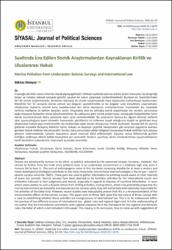Sualtında icra edilen sismik araştırmalardan kaynaklanan kirlilik ve uluslararası hukuk

View/
Access
info:eu-repo/semantics/openAccessAttribution-NonCommercial-NoDerivs 3.0 United Stateshttp://creativecommons.org/licenses/by-nc-nd/3.0/us/Date
2020Author
Anadolu Üniversitesi, Hukuk Fakültesi, Milletlerarası Hukuk Anabilim Dalı
0000-0002-1754-953X
Güneysu, Gökhan
Metadata
Show full item recordCitation
Guneysu, G. (2020). Sualtında ı̇cra edilen sismik araştırmalardan kaynaklanan kirlilik ve uluslararası hukuk. SİYASAL: Journal of Political Sciences, 29(1), 33–50.Abstract
İnsanoğlu denizleri sessiz ortamlar olarak algılayagelmiştir. Hâlbuki sualtında sesli ve canlı bir ortam mevcuttur. Bu zenginliği bozan ve rahatsız edecek seviyede gürültü yaratan bir takım çalışmalar sürdürülmektedir. Bunların en önemlilerinden biri de sismik araştırmalardır. Yenilenen teknoloji ile sismik araştırmalarda hava tabancaları kullanılmaya başlanmıştır. Böylelikle her 10 saniyede denize yüksek ses dalgaları yayılabilmekte ve bu dalgalar uzak mesafelere ulaşmaktadır. Uluslararası Hukuk’ta önemli konu başlıklarından biri deniz alanlarının sınırlandırılması meselesidir. Bu meselede verilmiş mahkeme ve tahkim kararları vardır. Oluşmakta olan bu içtihatta sismik araştırmalar izin verilen, sorumluluk doğurmayacak faaliyetler olarak görülmektedirler. Bu yaklaşıma göre sismik araştırmalar, sondaj gibi faaliyetlerden farklı olarak sınırlandırılacak deniz çevresine kalıcı zarar vermemektedir. Bu çalışmanın konusu bu algının bilimsel verilerle olan uyumsuzluğuna işaret etmektir. Sonrasında, gürültünün bir kirlenme çeşidi olduğunun tespiti ve gürültüye karşı oluşturulan hukuki yapı incelenecektir. Bu incelemede odak olarak Uluslararası Hukuk seçilmiştir. Burada ikili bir ayrıma gidilerek öncelikle Birleşmiş Milletler Deniz Hukuku ve Biyolojik Çeşitlilik Sözleşmeleri gibi evrensel uygulama bulması gereken hukuki metinler ele alınacaktır. Bunlar, daha sonra kabul edilen bölgesel uluslararası hukuk metinleri için çerçeve görevini üstlenmektedir. Çalışma kapsamına ulusal mevzuat dâhil edilmemiştir. Çalışma, sonuç bölümünde gürültü kirliliğini azaltmaya dönük tatbiki tavsiyelere yer verecektir. Bunlara uyulması, deniz sınırlandırılması uyuşmazlıklarının tarafı devletlerin eylemlerinin meşruiyeti açısından önemlidir. Oceans are perceived by humans to be silent, as publicly reiterated by the esteemed Jacques Cousteau. However, this cannot be farther from the truth since ambient noise in an underwater environment is a relatively high one, even if humans fail to hear it. The part of anthropogenic noise in this has been increasing steadily for at least a century and newly developed technologies contribute to this noise immensely. One of these new technologies is the air gun - used in seismic surveys since the 1960’s. These guns are used to gather information by emitting sound waves at short intervals of every ten seconds. Seismic surveys have been deemed to be harmless activities by the international courts and arbitration tribunals in their judgments and awards, especially in regards to disputes of maritime delimitation. In cases where states parties to such a dispute refrain from drilling activities, among others, which may potentially jeopardize the marine environment permanently, and execute seismic surveys solely, they will not be held internationally responsible for the activities of the latter kind. However, recent studies have indisputably proven that this is a misrepresentation of the environmental effects of the seismic surveys. This paper aims to throw light upon the real nature of these surveys with a view to establishing whether these activities are transgressions of international law. This is to be endeavored within the purview of two different sources of international law - global rules and regional legal rules. It is the understanding of the author that the international conventions with a global relevance form the framework for the regional and domestic rules, the latter of which is not included in this paper. This inquiry, in its conclusion, tries to come up with suggestions of a practical nature to mitigate underwater noise pollution. The implementation of these measures is significant for those states parties to actual maritime delimitation disputes, since they will augment the legitimacy of the activities carried out by them.
Source
SİYASAL: Journal of Political SciencesVolume
29Issue
1Collections
The following license files are associated with this item:


















